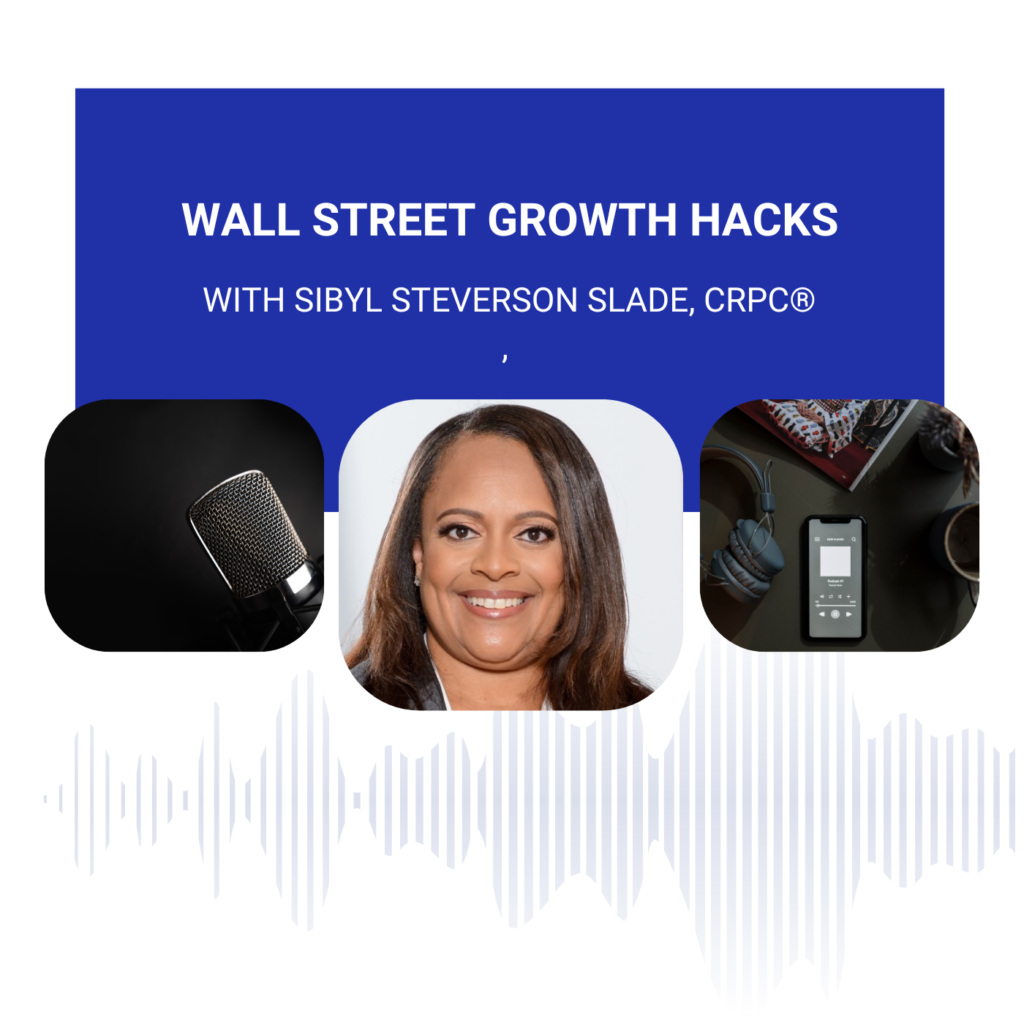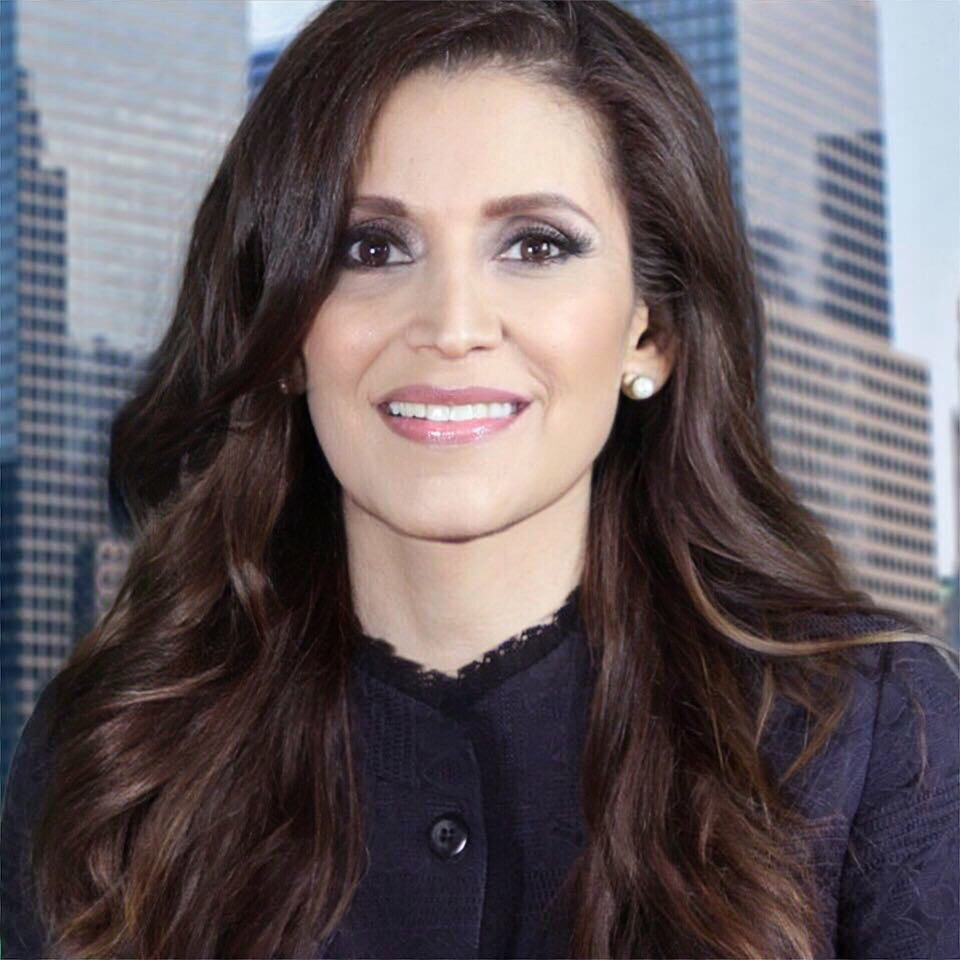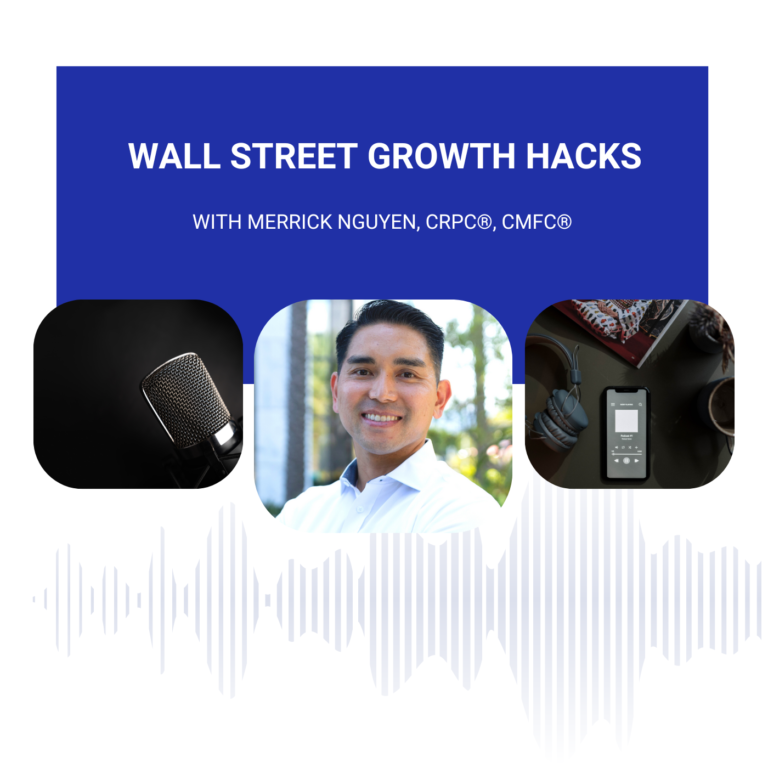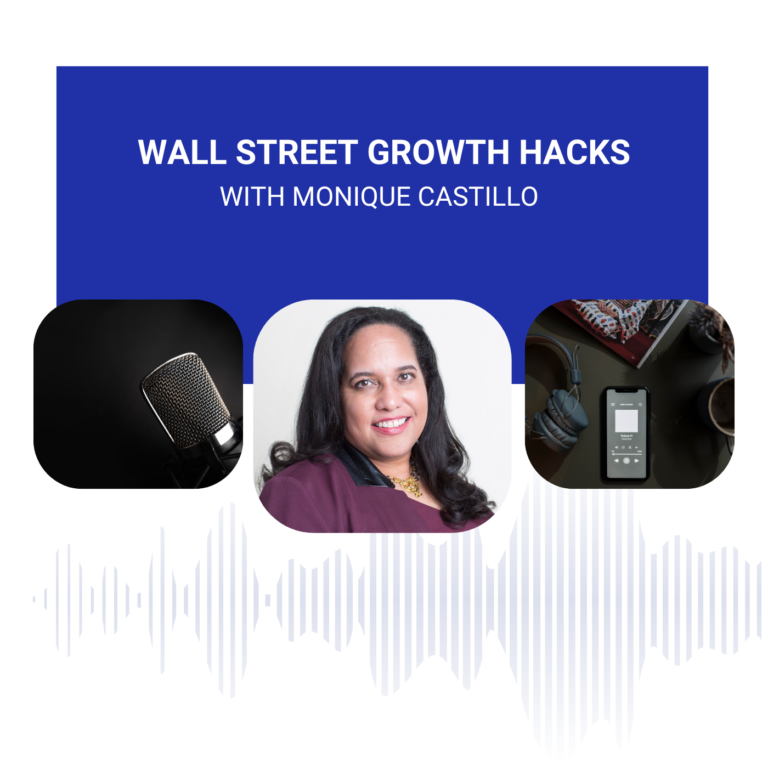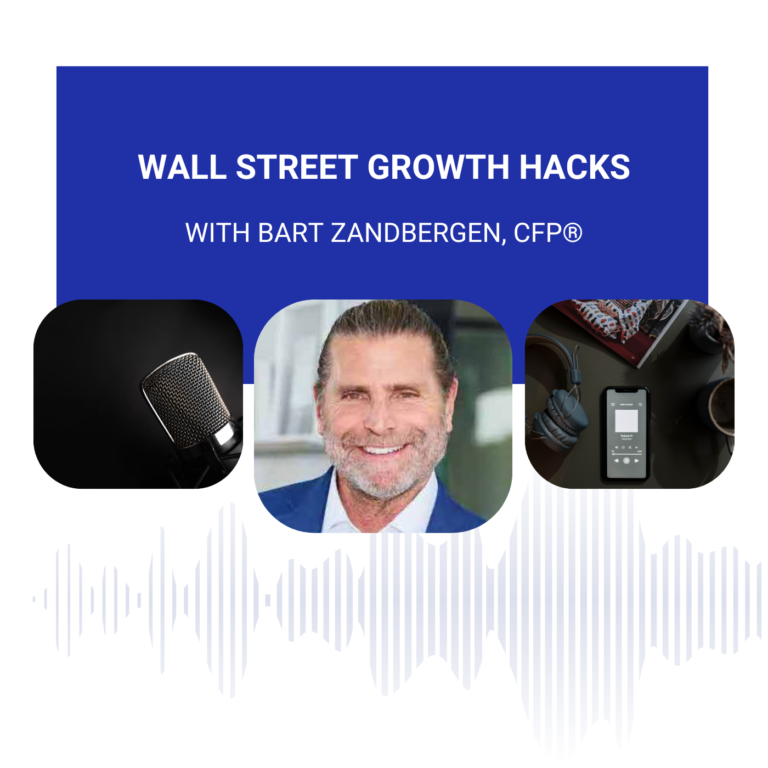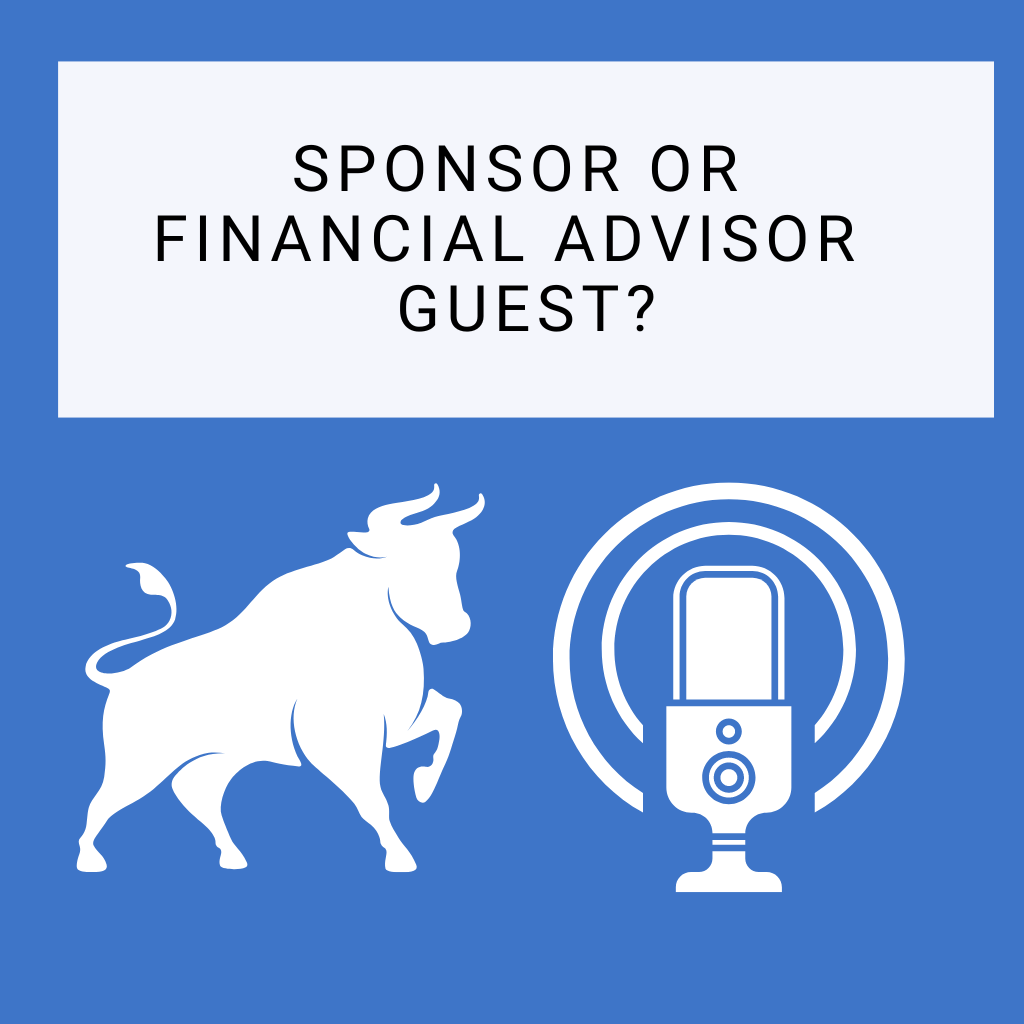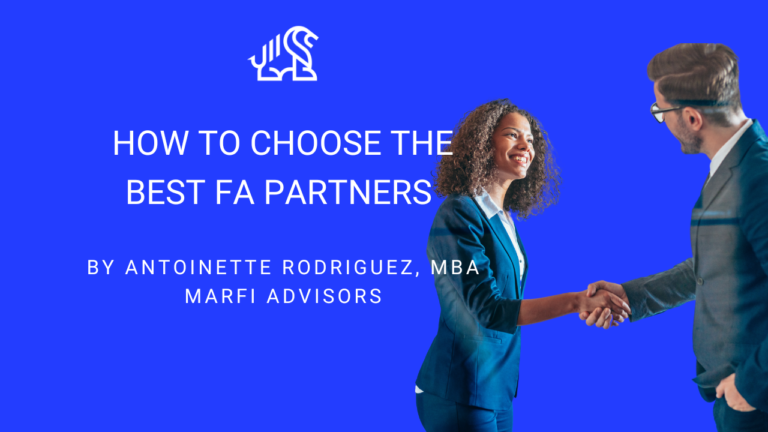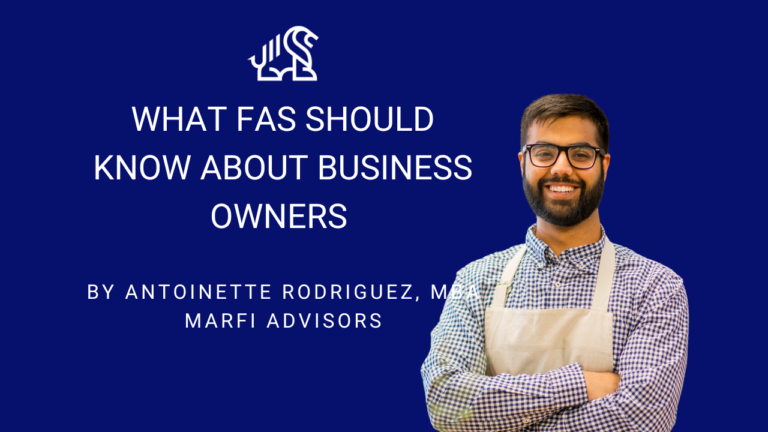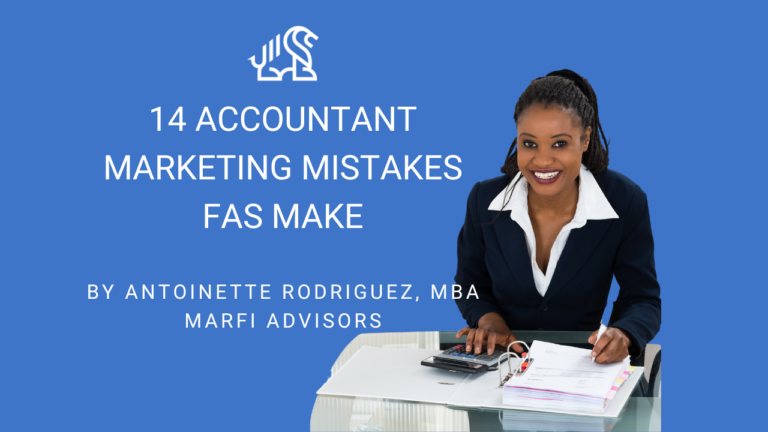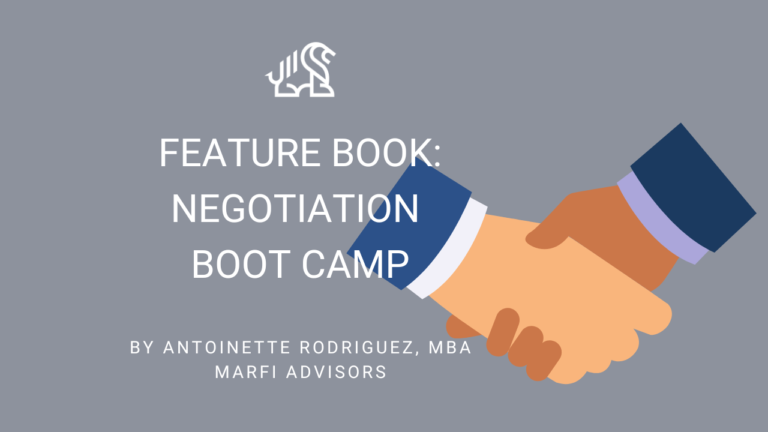WATCH VIDEO PODCAST
LISTEN AUDIO PODCAST
About Sibyl Steverson Slade
Financial Advisor, Sibyl Steverson Slade, CRPC is the founder of IntegriVest Wealth Advisors, LLC., She lends her 28 years of banking and financial services experience to provide personalized comprehensive financial planning and advisory services to small business owners and other professionals throughout Alabama, Arizona, Colorada, Florida, Georgia, Louisiana, Missouri, Nevada, and Virginia.
Sibyl is the author of I Can’t Sit Down, a collection of interviews with groundbreaking women of color.
CONTACT INFORMATION
Sibyl S. Slade, CRPC
President & Financial Advisor – IntegriVest Wealth Advisors
AI-GENERATED TRANSCRIPT
[00:00:00] Antoinette Rodriguez: Welcome to the Wall Street Growth Hacks podcast. I’m Antoinette Rodriguez, CEO of MarFi Advisors, a New York City-based 17-year marketing and strategy coaching firm for million-dollar financial advisors. Our guest speaker today is Sibyl Steverson Slade.
She’ll be sharing with us her fascinating journey from The Fed – to a financial advisor, the power of continuous learning, social capital, and why your yeses should be sacred.
Welcome to the show, Sibyl.
[00:00:46] Sibyl S Slade: Thank you so much, Antoinette. I am so excited to be here this morning!
[00:00:51] Antoinette Rodriguez: And you are in Atlanta?
[00:00:53] Sibyl S Slade: Yes, I am in Hotlanta.
[00:00:55] Antoinette Rodriguez: Hotlanta = very hot at this time. So, it’s really earning its name!
Steven Covey says that you should “start with the end in mind.” I’m sure you’ve heard this quote. Since financial advisors are tasked with the weight of their client’s financial life goals, consistent self-care cannot be overstated.
What do you do to charge and recharge?
[00:01:21] Sibyl S Slade: Great question. Every day I set aside the first hour of the day. My calendar is totally blocked out for that first hour. And I spend it doing daily devotional meditation. Or I’m listening to some podcast, depending on what’s going on in my world at that time, where I may need some inspiration.
And I like to sit and listen to my inner voice. I really set the tone for my day. I don’t wake up checking my email because I know once I get going, my whole day is off. I want to set the tone for my day. And then, when I really want a little more extra me time, I may do some Aquafit.
Some self-led Aquafit. I love water. I love nature. I like to walk around in nature. I ride my Harley. Anything that can help me to stay present with myself. This is what I tend to do for self-care. I knew that I was an ambivert, but I learned during COVID that my introvert is the strongest. It’s the most dominant.
So, I have to hear myself think. That’s when I can download. That’s when I generate new ideas. I just need to be in tune and fully present with myself.
[00:02:31] Antoinette Rodriguez: The way you start your day, it sets everything off, right?
Whether it’s diet or whether you eat breakfast or not. There’s a book out that talks a lot about digital technology. To make sure that you don’t start your day checking your email because it can really set you off into a rabbit hole of non-productivity.
You have a fascinating background. (From) your work at the Federal Reserve to what you’re doing now – led you to change careers.
Would you discuss an “aha” moment that led you down this path to becoming a financial advisor?
[00:03:05] Sibyl S Slade: Sure. As you alluded to, Antoinette, I had 21 years at the Federal Reserve. It was a stellar career. I really enjoyed being able to help financial institutions meet their community reinvestment requirements.
They had to provide products and services to underserved markets and underserved individuals. And a bit of community impact too. Being able to invest in communities where they could demonstrate impact.
While working at the Fed, one of the things that I noticed during the housing boom in 2004, was that in Georgia, over 50% of our mortgage origination was interest-only loans. I knew the minute those things reset, people would not be able to sustain the new mortgages. And for me, I felt we did a disservice. We did a disservice in promoting [00:04:00] home ownership as the primary way to build wealth.
Especially to those traditionally marginalized communities. So, I convinced my then-leadership that. I want you to pay for me to do a certification for financial planning. In turn, I would create a financial education curriculum that will allow individuals to understand that there are more pathways to generating wealth.
You and I know, Antoinette, small business owners’ investments in home ownership, or real estate, should I say, are the three main ways. But again, we only focus on home ownership. I wanted everyone to know that there’s a plethora of things that are available to them to build wealth. So that’s how I got started down the path. But unfortunately for me, I could not practice while still working at the Federal Reserve.
I could not start my financial services practice. It was a conflict of interest. I decided I would wait until I retired.
Unfortunately, in 2014, my function [00:05:00] was restructured to a research and publication role. I am truly a people person. I need to be where the rubber meets the road.
So I did not apply for the new position. I took my YOLO moment I launched out into financial services. And here I am today, seven years later.
[00:05:20] Antoinette Rodriguez: So tell us what YOLO stands for
[00:05:26] Sibyl S Slade: You only live once!
[00:05:31] Antoinette Rodriguez: There you go. Let’s do it. Ala Jennifer Lopez “Let’s Get Loud,” right?
Why did you decide to become an independent RIA? And was there anything that scared you about the business model? And, if yes, how did you overcome those fears?
[00:05:43] Sibyl S Slade: Oh, wow. For me, it was scary because I came from a regulatory background. I was used to being at the Fed and used to regulations.
I really wanted to have that back-office compliance. To support me and ensure that I wasn’t stepping out of bounds here and there. But [00:06:00] I found myself having a struggle with the captive model. I was always going to compliance with exceptions. Why? Because my clients were unique.
Most of the clients that I work with are first-generation college graduates or business owners. Many of them have student loan debt. It was very hard for me to talk to them about funding other goals when they had a hundred thousand dollars in student loan debt to repay. I really wanted to be able to educate themonh strategies to pay off ttheirstudent loan debt.
Unfortunately, there was nothing in our toolbox at the time at the entity that I was affiliated with. I was told basically I could not discuss those things. The other part of that, I had first-generation business owners. Trying to assist them with advanced tax-saving strategies that were not attached to a proprietary product became an issue as well.
I always had to ask for exceptions. I knew that in [00:07:00] order for me to properly serve my clients, I had to go independent. 2018, I took the leap of faith again and had another YOLO moment to go independent. It was the best thing that I could have possibly done for the clients that I served. As well as for myself, because that inner conflict left.
[00:07:21] Antoinette Rodriguez: You said marginalized or underserved communities and people who are relatively new to wealth. I’m not sure there’s a clear understanding of the general population. As to how much Maslow’s hierarchy and being really concerned about the basics first, not getting to those higher levels. It’s a different experience, right?
[00:07:39] Sibyl S Slade: Yes it is. A lot of people would feel hopeless because they’re not invited to these conversations. And why? Because they’re not necessarily attractive to some of the financial professionals out there. The reality is a lot of them are earning money.
They just don’t have investible assets at the time. If you’re able to work with them and able to start going through that model, [00:08:00] then they too will.
[00:08:01] Antoinette Rodriguez: And then you’re also taking advantage of what’s happening in the marketplace overall. With the largest wealth transfer ever in the history of the world, going to women and diversified groups – ethnic groups.
So yes, it can be a smart business move too. And a good business case.
[00:08:15] Sibyl S Slade: Yes.
[00:08:17] Antoinette Rodriguez: This next one is really cool. You wrote a book. “I Can’t Sit Down.” What is it about, and what prompted you to put it together or write it?
Sibyl S Slade: This is one of those; I don’t want to say secret passions. I would say secret, but it’s no secret because I constantly talk about it.
The wealth gap that has been so persistent amongst men and women has really been a sore spot for me. Especially for women of color. We have the most conferred degrees, but we are in the industries with the least-paying wages. And so while they’re historically have been these structural issues, there’s also the [00:09:00] non-structural. And the non-structural is that you see us as women of color with these conferred degrees. Again, those industries that we are in – are the lowe-paying industries
For the next generation, representation matters. They really need to see us in other industries so that they can aspire to do the same. The book is primarily for young ladies who are going through mentoring and leadership programs. So that they can see other women. And other industries who came from humble beginnings but who are now leaders in their fields and in their community.
I thought that this was so very important for a co for a couple of reasons. One, I know that my ancestors intentionally sacrificed so that I could have the opportunities that were not easily afforded [00:10:00] to them. And two – I am of the birth year where I had all of my Constitutional rights bestowed upon me.
I was born in 1968. I have all of the constitutional rights and I don’t take that lightly. I have a responsibility to be able to harness those things. But make sure that the next generation understands the importance of having all of these rights. Understanding how to close the gap. To be able to see themselves at tables that they might not have otherwise seen themselves at.
Representation matters. I now have a new granddaughter who was born this year. I hope that we’re not having this conversation when she becomes an adult. That she already sees representation. That she’s able to really harness this legacy.
Antoinette Rodriguez: Yes, so the normalization of people of color.
Look at us! We’re [00:11:00] Latina, African American. Look at this show for example. So yes, representation matters. This is why, for example, I kept my Rodriguez last name when I married. And now I’m divorced. I kept the Rodriguez name because I felt that there was too few Rodriguezes on Wall Street.
When I graduated with my MBA many years ago, the number was 0.0000. I forget what percentile was. It was so low it was ridiculous how few Latinas had a graduate degree. We’ve come a long way, but it is important for this next generation to do it now.
Sibyl S Slade: Yes. Yes. That’s right. So true.
Antoinette Rodriguez: The big elephant in the room = the pandemic, right? The pandemic has changed us in so many ways. What has been your approach to client retention and acquisition during the pandemic and since?
Sibyl S Slade: Ironically, my model was somewhat virtual anyway. [00:12:00] I had the business owners. I was already doing my meetings virtually and doing workshops virtually.
My clients loved that because they didn’t have to sit in an hour worth of Atlanta traffic coming to me. Then another hour to go home and an hour for a meeting. That’s three hours out of a day. So that was huge. When the pandemic came along, I just continued to do more of the same. But in this case, because of my previous background at the fed, and disaster response, I knew that communication was key.
I had partnered in the past with other professionals to do workshops. I gathered them together and said, “Hey, we really need to help businesses now!” We need to be able to reach out to them and help them to get their financials up to date. And oh, by the way, that was traditionally a problem prior to COVID. I already knew that problem existed.
I knew in order to get PPP [00:13:00] or to get capital right away, which is mainly what is needed in crisis, that we had to provide them with technical support. We provided them with the technical support to get their financials together and to pivot in general.
FEMA says that if a business is shut down for five days or longer, there’s a 90% chance that it will not survive. I knew that for the businesses we had to go ahead and get them connected to resources. To get capital flowing to them. To make sure that they had all of the documentation in place in order to receive the capital quickly.
And the other part of my book that I paid a lot of attention to – were those who were retired or close to retiring. With those individuals, I needed to know whether or not they wanted to hold the positions that they had. Or did they want to do something different? Ironically, all of them held the course. Of course, they took the downward [00:14:00] swing first quarter of 2020. But then they took the upward swing during that next quarter when things rebounded back. That’s when they saw that their portfolio was built for the sustainability that we initially set out to do.
So that they’re sustainable in their retirement. I was not the one to tell them not to look. I wanted them to look as well as my other clients. Because there might have been opportunities out there. Now that there are opportunities, let’s see what we can take advantage of. Just by those simple shifts between communicating, staying in front of everything, and keeping, clients abreast, my business grew during the pandemic.
And yes, in addition to really helping others to sustain, nothing really changed with my model. Except for more communication. Technology helped me to do it effectively and efficiently.
Antoinette Rodriguez: It’s almost easy to forget how soon or how close that was, right? And the PPP [00:15:00] loans, what a mad dash it was to get funding. When we weren’t sure how much was going to be available. Of course, people who had better resources or were more organized, were able to get the lion’s share of those first rounds. I’m assuming that part of the reason that your business grew is that you clearly provided a real high value at a timely moment. Of course, your crisis management background didn’t hurt, right?
[00:15:28] Sibyl S Slade: No, it did not. I knew exactly where to start. And I was just so excited that I had an existing network of partners who said, let’s do it. Some people might have dug in and felt something else was a priority, but they trusted me. We locked arm in arm and collectively helped over 271 businesses.
[00:15:45] Antoinette Rodriguez: Wow, that’s fantastic! What a great case study. This is what we’re talking about in terms of serving certain communities that might not already have a top CPA firm representing them. Or all their ducks in a row [00:16:00] because they’ve bought real estate in the past or commercial real estate.
This is obviously a testament to the value that you were providing to them. That you picked up so many new clients.
I thought that this was a very interesting part of your profile. You state that one of your differentiators is listening without judging.
Why is that important to people of color or newer investors?
[00:16:24] Sibyl S Slade: Oh, that’s very important. One. I always hear people who sit across from me, whether it’s a prospect and again, you’re right- minority. It doesn’t matter. They are embarrassed. “I’m sorry. I only have this.” For whatever reason, there is this stigma of embarrassment.
A lot of times it’s because of lack of knowledge. Or lack of financial assets or poor decision-making. Or some life crisis that has left them financially vulnerable. I have to operate in that no judgment zone because I understand that emotions are attached to money. [00:17:00] I need to have them be able to detach their emotion from the money conversation.
To that extent I even partner with a Ph.D. psychotherapist where we do financial therapy. This conversation has nothing to do with investments or assets. It’s all around the mental piece and the emotional piece that’s attached to money. I have to be in a no judgment zone.
That’s the only way they can be transparent with me to open up and share. Once we remove that clutter, then we can are able to build around money because they now know that money is a tool. It’s not a definer of who they are and their habits and behavior.
[00:17:43] Antoinette Rodriguez: I like that. And as far as it not having anything to do with investments you might argue that it has everything to do with investments. And in wealth-building the psychology part of it. That’s really true. And another value-add I see that you provide to your clients. That’s fantastic.
What adjectives would you [00:18:00] say clients use when they describe what you?
[00:18:04] Sibyl S Slade: When clients describe what I do, it’s ironic.
I really thought they would say I was knowledgeable. I was trustworthy and have integrity. All of those things that have followed me most of my life. But the reality is they all say they like that I listen. That I make complex conversations simple. And I really do that. That’s the only way that I can get them to buy in.
The reality is if I wasn’t doing financial services, no matter what I do, my CV= core values are around inspiration and education. I want to be able to inspire my clients. To do the things they need to do to be able to live the life that they want to live. And I want to educate them, so they understand why they’re doing what they do. Not just the how, but the why.
I was amazed when I did a survey several years ago that [00:19:00] they (clients) said I listened. That was what they valued the most.
[00:19:03] Antoinette Rodriguez: Interesting. I think you just came up with some keywords regarding how financial advisors should write their websites. A lot of the terms that we use in this industry are pretty generic. They’re not really speaking to the heart of why people use a financial advisor.
Who is your target market and why?
[00:19:24] Sibyl S Slade: I alluded to it earlier. My target market are primarily young professionals, first-generation business owners, and first-generation college graduates. The reason why is because they’re not invited to the wealth management conversation. There’s this preconceived notion that they don’t have investible assets, but many of them have income. Great income.
You’ve heard the word, the Henry’s, the high-earning young individuals? They just don’t know where to park it. They just need to be educated on where to park it. For [00:20:00] me, this is exciting because I’m able to help them take advantage of every opportunity and leave nothing on the table.
They can still retire comfortably like others, and they can also pass on generational wealth to their heirs. This is why I pretty much target that group. They’re not invited to the conversation, but they have the income to be able to create the reality they want. If they can dream it, I can help them to build and live it.
[00:20:31] Antoinette Rodriguez: And that’s how I know you’re in Atlanta. I love that.
What would you say you’d like our audience to take away today?
[00:20:44] Sibyl S Slade: The big word that we didn’t say a lot about today, but we said is a an investment. In this case, investing yourself and continuous learning is a must.
The only way you can properly serve people, no matter what field you’re in, is to be timely and [00:21:00] relevant. We have to continuously learn our craft. The other thing would be social capital. Our network is our net worth, and we have to have social capital. We can’t just focus on the money.
We can’t just focus on human capital. We have to have social capital. Who are we connected to? When we’re connected it creates all the possibilities in the world.
When I talked about how I was able to pivot through COVID, it was because of my network. Let me be perfectly honest, that social capital helped me.
And last but not least, this is my sacred cow. Keep your “yeses” sacred. Every time we say yes to something, we’re also saying no to something. And if the thing that we are saying no to is more important than the thing we’re saying yes to, then the answer is emphatically no!
[00:21:59] Antoinette Rodriguez: [00:22:00] And that is a great lesson for our girls, especially.
Sibyl, you are fantastic.
How does our audience find out more about you and get ahold of you?
[00:22:10] Sibyl S Slade:
I am Sibyl S. Slade on social media. You can find me either on the website (see below) or you can find me on social media. Again, Sibyl S. Slade.
[00:22:26] Antoinette Rodriguez: On behalf of Wall Street Growth Hacks, I’d like to thank Sybil Steverson Slade for her generosity in sharing her growth journey with us.
[00:22:36] Antoinette Rodriguez: And I want to thank each of you for listening or watching this episode in its entirety. If you are a successful financial advisor with a unique story. Or a service provider who would like to sponsor a podcast episode or series, fill out the form in this post or in the description area.
And please do Brooklyn girl, a favor subscribe, and like our show!
Podcast: Play in new window | Download (21.9MB)

